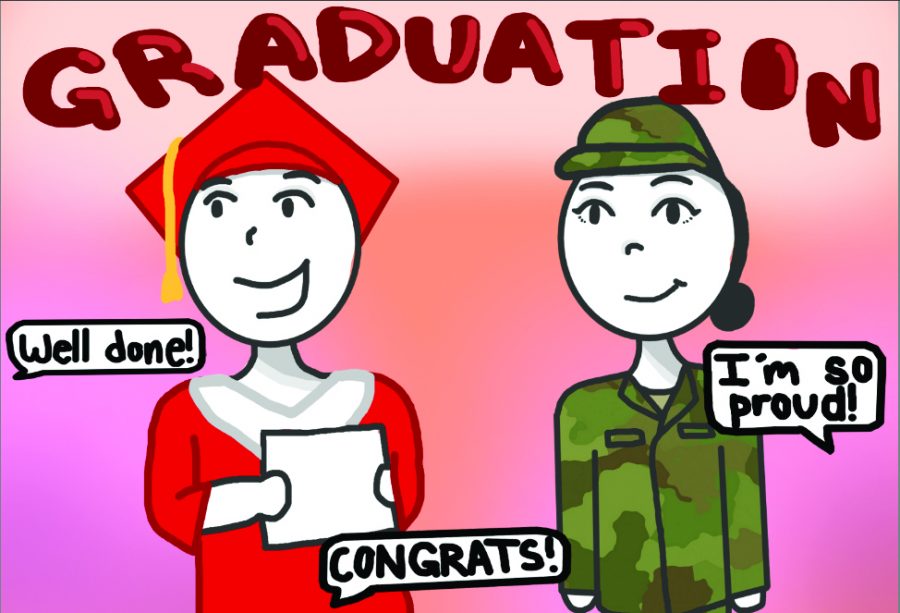OPINION: Armed Services test should be grad choice
Giving options to students is a good thing, especially for future graduation options
A student should be able to graduate through other means, and the ASVAB can be one of many new ways to graduate out of high school.
February 21, 2020
Students in this day and age have a multitude of options when it comes to their education. Regardless of skillset or preferred track, high schoolers in 2020 have significantly more ways to satisfy their graduation requirements. Many of those ways can set them on a more stable, well-paying path than the “one-size-fits-all” requirement that has been the hallmark of education plans for decades.
Take, for example, Washington’s decision to allow the Armed Services Vocational Aptitude Battery test (ASVAB) as an alternative to federally mandated testing. Essentially, what this means is that students no longer have to pass a federal series of tests to earn a high school diploma. Instead, the state of Washington allows for seven new passageways to graduation, including passing AP tests, college admissions exams, taking higher level college courses and of course, passing the ASVAB, which is the test every potential military recruit must take before entering the armed services.
Captain Spencer Sweat, the education officer for the WSU AFROTC program, gave a brief rundown of the ASVAB’s structure and format.
Sweat said that the ASVAB is designed to determine a potential recruit’s skillset, by testing them in math, word knowledge, paragraph comprehension and other skills that one would potentially see on the SAT or ACT tests. It also tests students on mechanical knowledge and general engineering skills, which are intended to determine a student’s capability for more mechanical jobs.
“The way all those certain subsets are combined indicates a certain aptitude for enlisted vocations,” Sweat said. “For example, if you score really well in the literature and language sections … then maybe you’ll do better in a clerical job, such as a personnelist, and not so well as an aircraft maintainer.”
This speaks to the way that the ASVAB can provide a more holistic view of a student’s personal success level, that’s often not indicated on a federal test. Students more suited for the trades or a mechanical job, which are often underrepresented in the field of high school education, can show their knowledge when taking the ASVAB.
That, fundamentally, is why this decision to make the ASVAB an official option when obtaining a high school diploma is a good one. Giving students the means to show the skills they’ve learned, whether in or out of a classroom, is significantly better than demanding more mechanically-minded students fit into the rigidly defined box that the federal school system has put in place.
In some cases, for certain students, the lessons learned through a military education might even be better than the lessons learned in a traditional high school experience.
“I think it [a military education] is better,” said Rachel Dietrich, a freshman at Simon Fraser University.
Dietrich said that her father, a Marine, gained valuable lessons from his career in the armed services, and that recruits might have more resources to choose from in the process of a military education.
That said, it’s important to remember that the ASVAB in and of itself is not a cure-all to students that might not fit the typical high school mold.
“I think there are pros and cons,” Sweat said. “I think it depends on what the objectives or the intent of the testing requirements are in the first place. Is it to see if the lessons being taught in school are getting digested and students are able to perform well, or are we simply looking for people’s aptitudes for careers moving forwards?”
Sweat’s comment speaks to the purpose of education in the first place, which is ostensibly to prepare students for the American and international workforce. The problem then, is to determine whether students are actually ready to survive and thrive in the real world, and how we choose to measure that.
“If someone shows a real propensity or a real talent for something, but they don’t have the piece of paper that would require them to get there … what’s to say that they couldn’t do the job, even if they didn’t take that one literature class?” Sweat said.
None of this is to downplay or discourage the importance and vitality of a comprehensive high school education: math, writing, social studies and all. However, it does mean we have to find a better measurement of student’s education and sometimes, we have to change the ways that we determine academic success. Washington students can only benefit from more options, and the ASVAB will absolutely be a help, not a hindrance.









